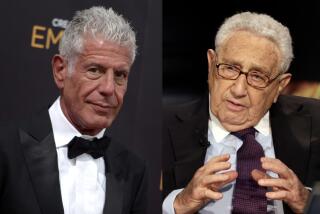Kissinger Marks Historic Journey by Praising Nixon
- Share via
YORBA LINDA — Precisely 25 years to the day after he and then-President Richard M. Nixon left on their historic journey to China, Henry Kissinger appeared Monday at the Richard Nixon Library & Birthplace to pay homage to the former president’s diplomatic achievements in Asia.
After a short tour of a new exhibition of artifacts, correspondence and photographs that document the work of 14 American Presidents in Asia, Kissinger made a speech on contemporary American relations with China.
Proving that the lure of Kissinger’s celebrity remains strong despite his long absence from public service, 700 crowded the grounds to get a glimpse of the man once considered one of the most admired people in the world.
From behind dark sunglasses, the former secretary of state reminded the crowd that the diplomatic ground broken by Nixon remains the basis of Sino-American relations a quarter-century later.
“The Shanghai Communique is a textbook example of how foreign policy should be conducted,” said Kissinger.
Signed in 1972 by Nixon and then-Chinese Premiere Zhou En-lai, the it represented the first direct communication between the two countries in the more than two decades that had passed since China’s revolution.
The communique recognized that the two countries could find common ground, such as opposing the further expansion of the Soviet Union into Europe.
It also recognized the vast ideological differences that existed between the two nations, and that they were willing to disagree on certain domestic affairs.
In spite of profound changes in the power structure of Asia since 1972--the meteoric growth of the Chinese economy, the emergence of India as a regional power and the disintegration of the Soviet Union--those lessons can apply today, he said.
In a subtle criticism of President Clinton’s attempts to change China’s human rights policies, Kissinger said that today’s American leaders need to tame their inclination to convert all foreign countries to an American style of government.
“China is an ancient country. It had 14 dynasties, 10 of which lasted longer than the entire history of the United States, and it managed to get through much of it without the help of the United States,” he said. “That is why they do not take it as self-evident that their domestic affairs should be prescribed by the United States.”
Rather, the oldest and the youngest of the world powers should combine their strength to create stability in the region, he said. Only stability will help China’s economy continue its growth and help prevent either country from becoming involved in costly military entanglements, he said.
China’s Consul General Feng Shusen, who attended Monday’s festivities, echoed Kissinger’s opinion.
China “longs for an international peace,” said Shusen. “China never interferes in other countries’ internal affairs and does not want others to interfere in her internal affairs.”
Among the many visitors to the library Monday was Michelle Brooks, 36, of Torrance, who said she found the speech enlightening.
Brooks was drawn to the event because she her father was an admirer of both Kissinger and Nixon. “Your whole insight changes when you hear see someone like that,” said Brooks. “It’s neat that somebody has interacted with all these countries and doesn’t think of them as enemies.”
More to Read
Sign up for Essential California
The most important California stories and recommendations in your inbox every morning.
You may occasionally receive promotional content from the Los Angeles Times.










